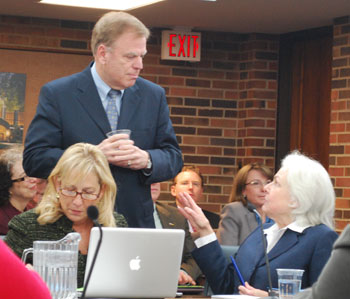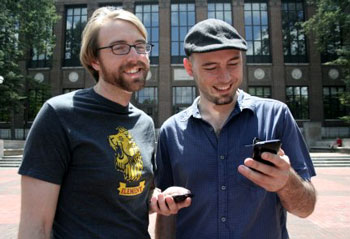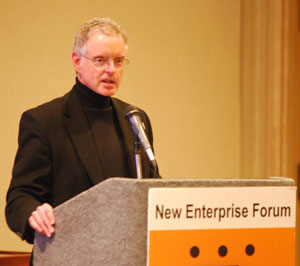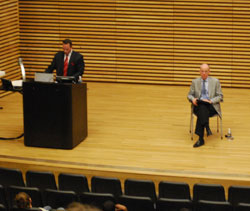Washtenaw County board of commissioners meeting (Nov. 2, 2011): At a meeting that lasted nearly five hours, commissioners gave initial approval to the county’s 2012-2013 general fund budget, following a discussion dominated by the topic of funding for state-mandated animal control.
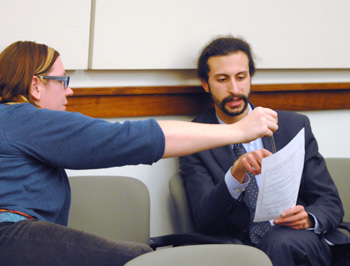
Jenny Paillon, director of operations for the Humane Society of Huron Valley, reviews some HSHV financials with county commissioner Yousef Rabhi (D-District 11) during a break at Wednesday's board of commissioners meeting. (Photos by the writer.)
With supporters of the Humane Society of Huron Valley (HSHV) demonstrating outside the county administration building and speaking during public commentary at the meeting, commissioners debated at length over how to handle its contract with the non-profit. The proposed budget calls for cutting HSHV’s contract from $500,000 this year to $250,000 in 2012 and 2013.
HSHV’s current two-year contract expires at the end of 2011, and leaders of the humane society have expressed reluctance to sign a new one with such a significant cut, saying that even at the current rate the county is not paying what the services are worth. [.pdf of HSHV analysis of legal and financial costs for mandated services]
For their part, some commissioners contended that they don’t yet know the actual cost of providing mandated services, and that HSHV hasn’t provided them with the kind of financial data they need to make an informed decision.
In the budget that received initial approval, the line item that originally earmarked $250,000 in annual payments to HSHV in 2012 and 2013 was renamed to “Mandated Animal Control,” a generic reference that reflects the possibility that the county might contract with another agency for animal control services – an option they discussed explicitly.
Board chair Conan Smith also proposed an amendment to move that line item out of the county’s funding for outside agencies, where it has traditionally been listed, and add it to the budget for the sheriff’s office. The funding could then be combined with a line item of $180,000 that is already part of the sheriff’s budget – for animal control officers. The county recently has discussed the possibility of paying HSHV $250,000 plus $180,000 – a total of $430,000 – if the humane society also takes responsibility for the work now done by the animal control officers. The shift in fund categories was approved on a 8-3 vote, with dissent from Rob Turner, Rolland Sizemore Jr., and Ronnie Peterson.
After the vote, sheriff Jerry Clayton spoke to the board during public commentary, saying he hadn’t been notified that this shift in funding to his office might occur. He expressed a range of concerns about the decision.
After making two other amendments not related to animal control, the board ultimately gave initial approval to the budget on a 9-1 vote, with dissent from Sizemore, who said he still has questions about it. Felicia Brabec abstained. Appointed two weeks ago to fill Kristin Judge’s vacated seat in District 7 (Pittsfield Township), Brabec indicated she’d like more time to review the budget document. Additional amendments are expected before the board takes a final vote on the budget, likely at its Nov. 16 meeting.
The board also got a third-quarter 2011 update from the county’s finance staff, projecting a nearly $1 million shortfall for the year, which will be covered by use of the county’s fund balance.
In other business, the county voted to create a planning task force for a new pilot program in agribusiness. Called ”Seeds for Change: Growing Prosperity in Ypsilanti,” the project is intended to provide job training and placement to unemployed workers interested in agricultural employment, and to offer shared commercial kitchen space and business support to local agribusiness entrepreneurs. No funding has yet been identified for the effort. [Full Story]






